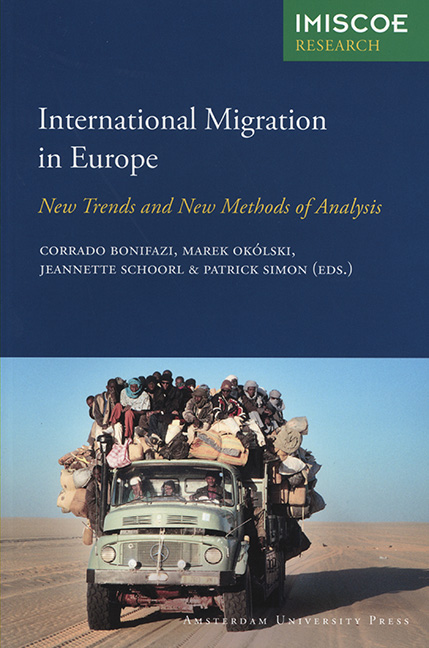Book contents
- Frontmatter
- Contents
- Preface
- 1 Introduction
- PART I NEW FORMS OF MIGRATION IN EUROPE
- PART II EVOLUTION OF REGIONAL PATTERNS OF INTERNATIONAL MIGRATION IN EUROPE
- PART III MEASURING INTEGRATION: IMMIGRANTS AND THE SECOND GENERATION
- PART IV SPECIAL SURVEYS IN INTERNATIONAL MIGRATION STUDIES
- List of Contributors
- Index
- Other IMISCOE Titles
4 - Migrant Smuggling and Trafficking in Portugal: Immigrants, Networks, Policies and Labour Markets Since the 1990s
Published online by Cambridge University Press: 22 June 2021
- Frontmatter
- Contents
- Preface
- 1 Introduction
- PART I NEW FORMS OF MIGRATION IN EUROPE
- PART II EVOLUTION OF REGIONAL PATTERNS OF INTERNATIONAL MIGRATION IN EUROPE
- PART III MEASURING INTEGRATION: IMMIGRANTS AND THE SECOND GENERATION
- PART IV SPECIAL SURVEYS IN INTERNATIONAL MIGRATION STUDIES
- List of Contributors
- Index
- Other IMISCOE Titles
Summary
Introduction
This chapter is based on a research project funded by the Foundation for Science and Technology (FCT) and the High Commissioner for Immigration and Ethnic Minorities (ACIME), Portugal, ‘Migrants trafficking in Portugal: sociological, juridical and political perspectives’, a project carried out from January through December 2004. First, the chapter will deal with the main conceptual questions involved in this issue. The theoretical difference between the trafficking and smuggling of migrants will be the axis of the discussion. Second, some of the research project aims and methodology will be presented, since they inevitably constrained the empirical evidence produced. Third, some of the projects’ main results will be presented. Attention will be focused on the forms of smuggling of and trafficking in migrants into Portugal since the late 1990s, including irregular labour flows targeted for several segments of the labour market and, in particular, trafficking in women for sexual exploitation. Fourth, the results will be discussed in terms of their main theoretical implications. The issues under consideration will be the interlinking between forms of trafficking, smuggling and ‘regular’ migration; the causes of these phenomena; and the dynamic interaction between the agents.
Conceptual questions
The theoretical framework of this project was built around the main concepts and the existing literature on the study of migrant trafficking and smuggling, including the relevant evidence already collected. Despite the difficulty of empirically examining migrant trafficking and smuggling, given its illegal and informal ways of functioning, a considerable body of literature is already available on the subject, providing some good insights in this area (for a recent state of the art, see Peixo to et al. 2005). For the purpose of this chapter, only the main conceptual debates will be highlighted.
Generally speaking, different types of human movements are usually conceived under the broad label of ‘trafficking’. The most important distinction in this field separates smuggling from trafficking. Theoretical definitions of both phenomena are not always equivalent, and empirical descriptions frequently use the expression indistinctively (IOM 2000; Salt 2000; Aronowitz 2001). However, there are important theoretical differences between the two terms.
- Type
- Chapter
- Information
- International Migration in EuropeNew Trends and New Methods of Analysis, pp. 65 - 86Publisher: Amsterdam University PressPrint publication year: 2008

